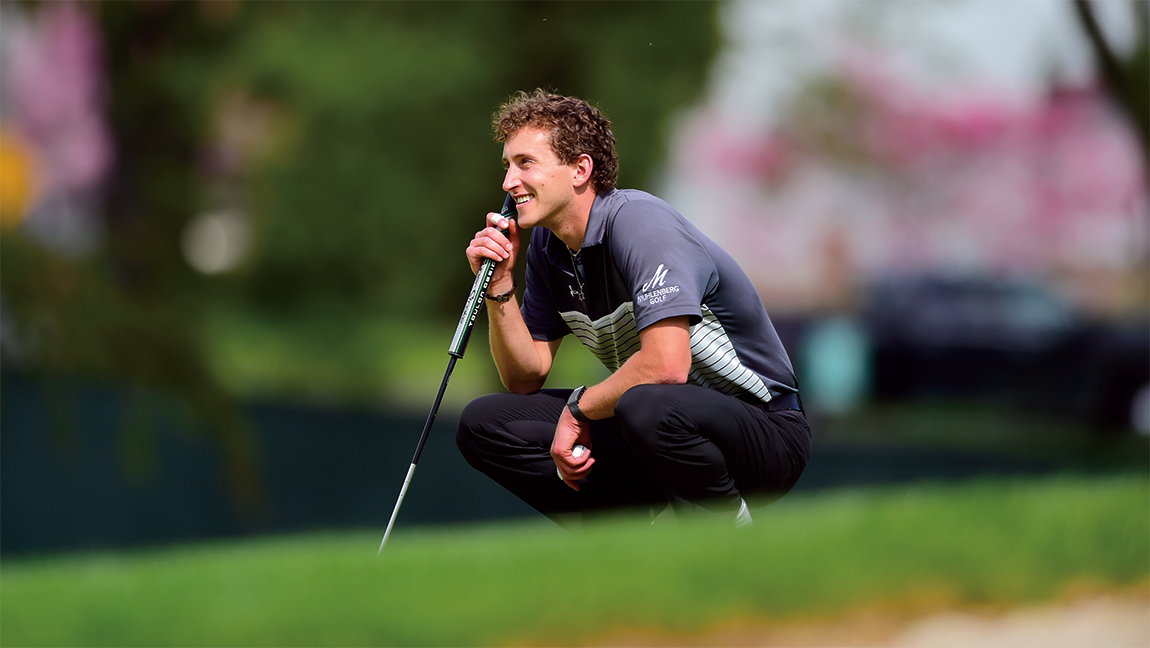Personally Speaking: Joel Hark ’22
Joel Hark ’22 is a neuroscience and psychology double major from Voorhees, New Jersey.Friday, March 18, 2022 01:51 PM
 Joel Hark ’22. Photo by David Sinclair
Joel Hark ’22. Photo by David SinclairPersonally Speaking is a feature of Muhlenberg Magazine in which our writers interview students and alumni about their own personal stories. This article was originally published in the Spring 2022 issue of Muhlenberg Magazine.
He knew he wanted to golf at Muhlenberg …
“I’ve played golf since I was 7 years old—it stemmed from me watching Tiger [Woods] with my grandparents. I was a strong golfer in high school and I wanted to play in college. I started by looking at Division I schools, but it was difficult to get in touch with coaches and it seemed like it wasn’t meant to be. My mom was like, ‘Let’s check out Muhlenberg—Poppy [Hark’s grandfather, Dr. Marvin Roth ’58] went there.’ I don’t remember much about the actual campus tour, but I got to meet the golf coach and some teammates and I saw the course I’d be playing at. I got a really good feeling and I applied early decision. At Muhlenberg, I knew I’d be able to play at a high level and have a balance between sport and academics.”
… but finding his academic passion took time and mentorship.
“I intended to do prelaw or political science coming in, but it wasn’t for me. I switched to bio to be pre-physical therapy, and that wasn’t it either. I’ve always been interested in stress, and I wanted a deeper understanding beyond a behavioral understanding, so I declared a neuroscience major. Sophomore year, I took Psychopharmacology, a neuroscience elective, with [Professor of Psychology Jeff] Rudski. At the end of the semester, he reached out asking to meet. He said, ‘You should really look into sports psychology,’ and he sent me a bunch of books and articles to read. And I did, and everything clicked. I declared psych as my second major and he’s my advisor. My grades have progressively increased. It was the first time a professor reached out to me and saw potential. After undergrad, I want to study sport and performance psychology.”
He applies what he’s learned from sports psychology to his own athletic pursuits …
“Mindfulness is the idea of being present. That’s something athletes have a tendency to struggle with—sometimes there’s so much going on that they can’t be ‘in the zone.’ Meditation is practicing accepting your thoughts. It’s not getting rid of thoughts. It’s saying, ‘It’s okay. I have these thoughts. I’m just going to recenter myself.’ And you do that by paying attention to your breathing and your five senses. Once I dove into practicing mindfulness, especially during the walks between shots or if I were to become stressed, I’ve definitely noticed a significant increase in my ability to focus for four-and-a-half or five hours.”
… and he co-founded a mental health organization to support other student-athletes.
“My friend [Natalie Smith ’22, a softball player] and I surveyed a bunch of athletes and came up with Head in the Game, a support group for student-athletes. It’s a space where we can share the similarities we have—experiences with coaches, with teammates, with performance issues. We wanted to create something to give student-athletes the opportunity to practice mental health. We lead each meeting with a short meditation and then we have open discussions. In the fall, we worked with Body Positive, another student mental health organization that revolves around viewing our bodies positively, as well as Mental Health Peer Advocates, which helps find resources for students. This semester, I want to work with [Associate Director of Prevention Education] Jules Purnell to have more speakers and educational sessions in addition to support sessions.”
Helping to found Alpha Epsilon Pi [AEPi] at Muhlenberg built his leadership and communication skills.
“When I was a sophomore, I was part of a group that wanted to find another community at Muhlenberg. Something Muhlenberg prides itself on is ‘if we don’t have it, you can create it,’ so we took that initiative. AEPi is considered the Jewish fraternity, and out of the 25 founding fathers, I would say 22 of us were Jewish. We reached out to AEPi headquarters and then started working toward the end goal: to become chartered, which happened last fall. That was a two-and-a-half-year process of raising philanthropy money, supporting the community and growing continuously each semester, even during COVID. For the first year-and-a-half, I served as vice president, and last year, I was president. Greek life sometimes gets a bad rap, but those leadership roles, as well as my involvement as an Orientation Leader, are where I have had a lot of my growth and developed a lot of my communication skills.”
